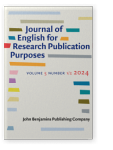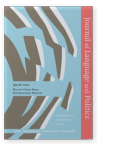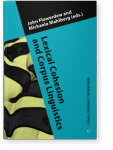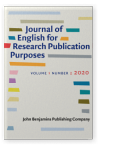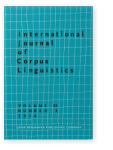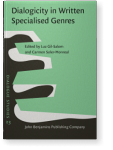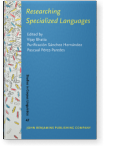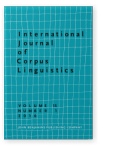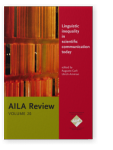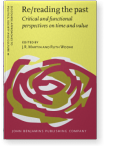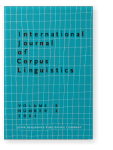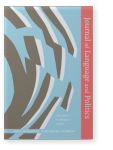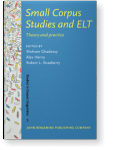John Flowerdew
List of John Benjamins publications for which John Flowerdew plays a role.
Journal
Titles
Occupy Hong Kong: Historicizing Protest
Edited by John Flowerdew and Rodney H. Jones
Special issue of Journal of Language and Politics 15:5 (2016) vi, 147 pp.
Subjects Communication Studies | Discourse studies | Pragmatics
Lexical Cohesion and Corpus Linguistics
Edited by John Flowerdew and Michaela Mahlberg
[Benjamins Current Topics, 17] 2009. vi, 124 pp.
Subjects Corpus linguistics | Discourse studies | Functional linguistics | Pragmatics
Lexical Cohesion and Corpus Linguistics
Edited by John Flowerdew and Michaela Mahlberg
Special issue of International Journal of Corpus Linguistics 11:3 (2006) 128 pp.
Subjects Computational & corpus linguistics
2020 English for research and publication purposes: A personal view Journal of English for Research Publication Purposes 1:2, pp. 170–183 | Article
In this Perspectives article I would like to look back over my over 25 years as a researcher in English for Research Publication Purposes (ERPP) and consider some of the milestones, both in terms of my own contribution and of those of others in the field, as I have encountered them. Most ERPP… read more
2018 A critical review of research and practice in data-driven learning (DDL) in the academic writing classroom International Journal of Corpus Linguistics 23:3, pp. 335–369 | Article
Since the late 1980s, there has been a growing interest in the direct application of corpora, or data-driven learning (DDL), in language education. This relatively novel teaching approach has been particularly applied in the teaching and learning of English for Academic Purposes (EAP)/academic… read more
2016 A historiographical approach to Hong Kong Occupy: Focus on a critical moment Occupy Hong Kong: Historicizing Protest, Flowerdew, John and Rodney H. Jones (eds.), pp. 527–548 | Article
This article is conceptualised within the framework of a historiographical approach to critical discourse analysis (Flowerdew 2012). It focusses on a critical moment in Hong Kong’s socio-political development, the Occupy movement, and a specific language event, an interview on a local Hong Kong… read more
2016 Occupy Hong Kong: Historicizing Protest Occupy Hong Kong: Historicizing Protest, Flowerdew, John and Rodney H. Jones (eds.), pp. 519–526 | Article
2014 Foreword Dialogicity in Written Specialised Genres, Gil-Salom, Luz and Carmen Soler-Monreal (eds.), pp. ix–xvi | Foreword
2011 Some dichotomies in genre analysis for Languages for Specific Purposes Researching Specialized Languages, Bhatia, Vijay, Purificación Sánchez and Pascual Pérez-Paredes (eds.), pp. 139–154 | Article
Genres are staged, structured, communicative events, motivated by various communicative purposes, and performed by members of specific discourse communities (Swales, 1990; Bhatia, 1993, 2004; Berkenkotter and Huckin, 1995; Johns, 1997). Since its inception with the two seminal works on the topic by… read more
2010 Use of signalling nouns across L1 and L2 writer corpora International Journal of Corpus Linguistics 15:1, pp. 36–55 | Article
A signalling noun is the use of an abstract noun the full meaning (realisation) of which can only be made specific by reference to its linguistic context. Examples of nouns which can function as signalling nouns are attitude, consequence, difficulty, effect, process, reason and result. The… read more
2009 Use of signalling nouns in a learner corpus Lexical Cohesion and Corpus Linguistics, Flowerdew, John and Michaela Mahlberg (eds.), pp. 85–102 | Article
Signalling nouns are nouns which have cohesive properties across and within clauses. A signalling noun is potentially any abstract noun the full meaning of which can only be made specific by reference to its context. Examples of nouns which can function as signalling nouns are attitude, assistance,… read more
2007 The non-Anglophone scholar on the periphery of scholarly publication Linguistic inequality in scientific communication today: What can future applied linguistics do to mitigate disadvantages for non-anglophones?, Carli, Augusto and Ulrich Ammon (eds.), pp. 14–27 | Article
As a symptom of globalization and the marketization of the universities, more and more scholars, many or most, of whom use English as an additional language (EAL), are being required to published in English. This article presents some qualitative data which highlights some of the difficulties… read more
2006 Use of signalling nouns in a learner corpus Lexical Cohesion and Corpus Linguistics, Flowerdew, John and Michaela Mahlberg (eds.), pp. 345–362 | Article
Signalling nouns are nouns which have cohesive properties across and within clauses. A signalling noun is potentially any abstract noun the full meaning of which can only be made specific by reference to its context. Examples of nouns which can function as signalling nouns are attitude, assistance,… read more
2006 Introduction Lexical Cohesion and Corpus Linguistics, Flowerdew, John and Michaela Mahlberg (eds.), pp. 261–263 | Article
2003 History as discourse; discourse as history: “The rise of modern China” — A history exhibition in post-colonial Hong Kong Re/reading the past: Critical and functional perspectives on time and value, Martin, J.R. and Ruth Wodak (eds.), pp. 195–216 | Article
2002 Rhetorical strategies and identity politics in the discourse of colonial withdrawal Identity Politics, pp. 149–180 | Article
Skilful use of the rhetorical tropes which typify the language of serious political occasions — described here as “rhetorical weight” — is closely associated with charismatic political leaders. This paper studies the political rhetoric of a skilled exponent of the art, Chris Patten, the last… read more
2001 4. Concordancing as a tool in course design Small Corpus Studies and ELT: Theory and practice, Ghadessy, Mohsen, Alex Henry and Robert L. Roseberry (eds.), pp. 71–92 | Article
